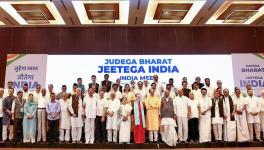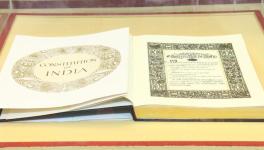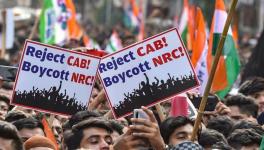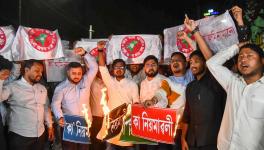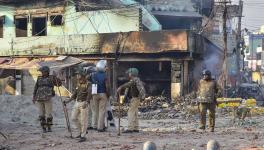Experts Say Sikh Leadership Must Oppose Atrocities Against Muslims

Recently, a gurudwara association in Gurugram, Haryana, opened its doors to Muslims who had bands of Hindu groups harassing them and protesting their offering namaz even at designated spaces. This gesture of brotherhood was welcomed from far and wide, yet it also raised some questions for the Sikh religious and political leadership.
Many Sikh historians feel the marginalisation of Muslims across north India since the Modi government came to power should not be allowed to pass unchallenged. They say the leadership of a community labelled a “protector” should break its silence on atrocities against any minority community. They also say that while Punjabi civil society has kept raising its voice against the targeting of Muslims by Hindu fundamentalists, it is time community leaders also raise their voice for Muslims and against their mistreatment.
“This [mistreatment of Muslims] should not be tolerated; they are citizens of India,” says Dr Joginder Singh, head of the Sikh History and Research Center, Khalsa College Amritsar. “It is not just about Muslims. Sikhism teaches us to fight injustice and this struggle is part of our history. Our gurus sacrificed their lives and families for justice,” he adds. According to the message of Guru Nanak Dev, if there is injustice, Sikhs must raise their voice against it. “The exact words are, ‘Nanak naam chardi kala tere bhane sarbat da bhala—which means ‘blessings and peace for everyone’,” says Joginder Singh.
In August 2019, BJP leaders started making offensive remarks about Kashmiri women in public after the abrogation of Article 370 of the Constitution in Jammu and Kashmir. Soon after, Giani Harpreet Singh, the Jathedar or head of the Akal Takht, the top decision-making body of the Sikhs, issued a powerful condemnatory statement. He said, “Kashmiri women are part of our society. It is our religious duty to defend their honour. Sikhs should protect their honour for the sake of duty and history.” The statement of the Akal Takht had such a strong impact that no BJP leader uttered a single word about Kashmiri women after it.
The holy book of the Sikhs, the Guru Granth Sahib, has many hymns and shabads such as ‘Shora so pehchaniy joh lade deen ke het—he alone is brave who fights for the underprivileged/helpless.’ Such lines are crystal clear about the duty of Sikhs toward others. It is another reason why historians feel the religious and socio-political heads of the Sikh community must urgently speak out for Muslims anywhere in the country. “I think the influence of the Jathedar of the Akal Takht is very crucial and his intervention necessary. But unfortunately, this institution has been marginalised because of the political functioning of the Akali Dal and the Shiromani Gurdwara Parbandhak Committee,” feels Dr Joginder Singh. “Yet, if Jathedar Gyani Harjeet Singh acts independently in this regard, it could bring some relief for the Muslim community, which would be most welcome and desirable,” he adds.
Experts also point out that Punjabi civil society and groups have regularly opposed the targeting of Muslims by Hindu fundamentalists. “It is not that the Sikhs are not speaking on this issue [of ill-treatment of Muslims],” says Harjeshwer Pal Singh, professor of history at the Guru Govind Singh College, Chandigarh. He adds, “Civil society in Punjab is very vocal about it.” He points out that Punjabis participated in the anti-Citizenship Amendment Act (CAA) protests in Delhi and that by and large, the Punjabi Sikh community has stood with Muslims. “But I feel the Sikh religious institutions should speak out for their fellow minority too. Still, we cannot call it a failure of the Sikh community on this issue,” he says.
There are still expectations that the Sikh political and religious leaders would also break their silence, just like individuals and civil society have. The view is that the Sikhs must oppose the creation of a situation that they had to confront during the eighties due to the same people and police.
Another perception about Sikhs is that they are silent because of past atrocities by Mughals and execution of Sikh gurus in particular. It is a perception avidly propagated by the Hindu right-wing forces. However, experts demolish this argument with solid historical references. “The atrocities of the Mughals against the Sikhs are not an issue at all,” argues Sarabjinder Singh, Director, Jagatpur Baba Center for Interfaith Harmony, Patiala. “In Sikh history, two Muslim brothers, Gani Khan and Nabi Khan helped Guru Govind Singh ji escape from the siege of the Mughals in Machiwara, Punjab. Sikhism is always against cruel, merciless regimes. Then, Mughals were the ‘zalim’ [oppressor]. If any other community was doing the same things, the guru surely would have fought them.”
There are a number of historical events wherein the Muslims fought for the Sikhs, even sacrificing their lives. After Guru Teg Bahadur was martyred along with Bhai Sati Das, Bhai Mati Das, and Bhai Dayala Das at Delhi’s Chandni Chowk, Abdulla Khawaja, keeper of the jail at Chandni Chowk Kotwali in Delhi revolted against the Mughals. He was the first person to reach Anandpur Sahib with information about the executions.
Sikh gurus were executed, but other gurus did not cease interacting with Muslims and continued business with Mughal rulers. This did not change in the 18th century, when the Sikh rulers were in power. For example, most Sikh rulers in the Malwa region issued coins in the name of the Afghan king Ahmad Shah Abdali. “It is a wrong notion that there was a consistent conflict between the Sikhs and Muslims,” says Dr Joginder Singh. “You can also take the example of Pir Buddhu Shah. He fought on behalf of Guru Govind Singh ji. So, there are number of instances in the Sikh History where Muslims fought for Sikhs.”
Even the composition of the Khalsa army led by Banda Bahadur Singh in the 18th century was substantially Muslim. “My perception is that the Sikh leadership missed a chance when the special clause of the Constitution for Kashmiris was withdrawn by this government,” feels Dr Joginder Singh. “Sikh leaders should have sent a message to the minority community. They think they have a good reputation with Delhi, so they are safe, but nobody is safe.”
“Look at how the government and media labelled the farmers protesting against the three farm laws as Khalistani and separatist,” he concludes.
The author is a freelance investigative journalist. The views are personal.
Get the latest reports & analysis with people's perspective on Protests, movements & deep analytical videos, discussions of the current affairs in your Telegram app. Subscribe to NewsClick's Telegram channel & get Real-Time updates on stories, as they get published on our website.









